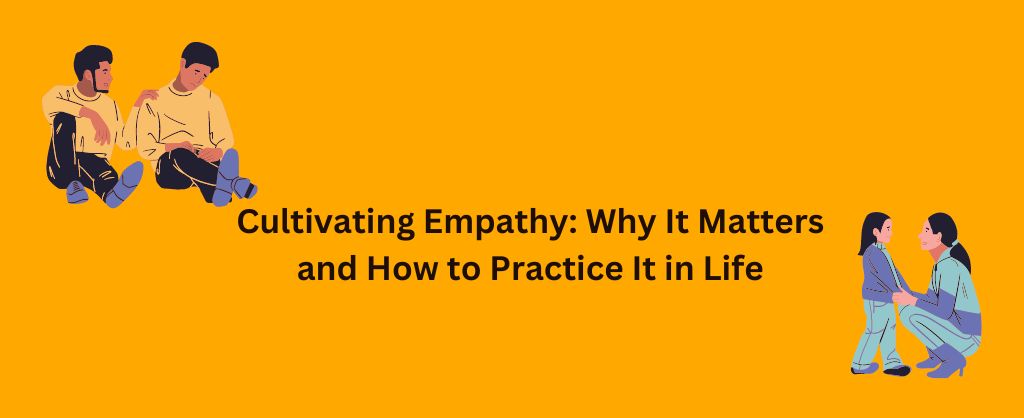Why Empathy Matters and How to Practice It in Life

You ever have one of those days where everything seems to go wrong? You wake up late, spill coffee on yourself rushing out the door, get stuck in traffic, and arrive at work frazzled only to find your computer crashed and you’ve lost an important file. And to make matters worse, people just seem extra annoyed and insensitive today, ignoring your plight or making snide remarks.
In moments like these, what we often crave most is a little empathy – for someone to acknowledge what a rough morning we’ve had, offer a kind word, and maybe help us get back on track.
Empathy has a remarkable way of making us feel seen, understood, and less alone. And research shows it not only soothes us when we’re struggling, but also helps us connect better with others day-to-day.
But here’s the catch – in order to receive empathy, we also have to give it. Empathy is a two-way street that requires stepping outside our own experience and entering into another’s worldview. This effort to understand what others are feeling and why makes empathy a powerful force not just in our individual relationships, but also in creating a more just, inclusive society.
Though empathy often comes easier with close loved ones, there are skills we can practice to extend empathy to people in all areas of our lives – at work, in our communities, and across divisions of race, politics, religion, or socioeconomic status.
By actively working to become more empathetic people, we can transform our own lives, relationships, workplaces, and world for the better.
The Subtle Differences Between Empathy & Sympathy Explained
In this article, we’ll take an in-depth look at why empathy matters so much, how it benefits us when we cultivate it in different spheres, and – most importantly – specific tips you can use to inject more empathy into your everyday life.
Why Developing Empathy Is So Important
Let’s start with the fundamentals – why does empathy matter in the first place? Well, for starters, science shows that it’s built into us as social beings. When we see another person experiencing an emotion, our brain activates similar neural networks so we can literally feel a hint of what they’re feeling. This helps us relate and respond with care.
But empathy has power far beyond just mirroring emotions. Researchers define it as the ability to understand what others are feeling, why they feel that way, and to communicate that understanding compassionately. And wouldn’t we all love to feel truly understood?
Here are some of the key life-enhancing, relationship-strengthening benefits empathy can offer:
- It helps us support loved ones – Whether it’s listening patiently as your partner shares their work stress or consoling your child after a tough loss, empathy allows us to be there for those we care about in the right way.
- It deepens bonds and trust – Feeling truly seen, heard, and understood by another person helps form profound connections. Empathy builds bonds of trust and intimacy that make relationships thrive.
- It avoids misunderstandings – If we assume we already know how someone feels or what they’re thinking, we often project our own biases. But empathy requires us to set aside preconceived notions.
- It defuses conflict – One study found couples were happier when they showed empathy for each other during conflicts. Being able to see the other’s perspective makes resolving arguments much easier.
- It helps leaders motivate – Whether it’s rallying the troops or helping an employee feel valued, managers who demonstrate empathy are able to ignite passion and boost morale.
- It drives social progress – Revolutionary social reformers like Gandhi and Martin Luther King Jr. relied on helping the masses empathize with oppression and imagine a more just world.
Clearly, empathy packs some transformative social and personal benefits. And the great news is, even if it doesn’t come naturally to you, empathy is a skill we can all cultivate.
Keep reading as we explore concrete tips to help you unlock greater empathy in all your relationships and make a positive difference in people’s lives.
Being More Empathetic in Personal Relationships
Our closest relationships – with partners, immediate family, and friends – offer some of the greatest rewards when empathy can flourish. Letting loved ones know we genuinely understand them during good times and bad creates a profound sense of support. It’s the glue that holds relationships together through thick and thin.
However, showing genuine empathy isn’t always easy. Our own needs, biases, and desire to problem solve can get in the way.
Try these tips to nurture empathy with your nearest and dearest:
Focus completely on them – When someone is opening up to you, give them your undivided attention. Avoid multi-tasking and be present. Making eye contact and facing them fully shows your engagement.
Withhold judgment – As they share feelings, especially difficult ones like anger or grief, don’t criticize or immediately offer advice. Keep an open mind rather than jumping to conclusions.
Ask thoughtful questions – Inquire gently to understand why this experience holds meaning for them. Ask how it makes them feel and how you can best support them.
Note nonverbal cues – Instead of over-relying on words, pay close attention to facial expressions, tone of voice, body language and what is left unsaid. These cues often relay underlying emotions.
Express affection and care – When they feel low, a hug, kind words or acts of service like bringing a meal or running an errand can show you empathize with their challenges.
Validate them – Let them know, “I understand this is disappointing for you,” or “It makes sense you feel this way.” People want their emotions and experiences to feel respected.
Make empathy about understanding your loved one rather than leaping to fix all their problems. Offer help once they feel genuinely listened to.
With practice, empathy can become your superpower that transforms even the most difficult relationships.
Why Empathy Must Be Cultivated At Work
You know those nightmare bosses we all complain about – the ones who are hyper-critical, expect the impossible, or refuse to listen to employees’ concerns? Many likely suffer from a dire lack of empathy. They put results and bottom lines first without realizing that showing empathy itself is great for business.
Ignoring people’s feelings and perspectives leads to toxic, cutthroat work cultures. But when empathy can thrive at every level of an organization, the benefits speak for themselves:
- Greater collaboration – Empathy helps co-workers understand each other’s unique skills and communication styles. This gets projects done smoother and faster.
- Happier, loyal customers – Sales and service people who demonstrate empathy provide a human touch that delights customers and earns loyalty.
- Increased innovation – Empathetic leaders who encourage all employees to share ideas are more likely to find those game-changing solutions.
- Improved inclusion – Taking the time to understand different people’s realities and challenges leads to policies that create a respectful, diverse workplace.
- More efficient change – Major transitions like mergers or digital transformations succeed best when leaders empathize with workers’ uncertainties first.
Clearly, empathy is not some unnecessary “nice” behavior – it drives results.
Here are some key ways managers and CEOs can weave more empathy into company culture:
- Get to know employees’ talents and needs – Understand them at a human level by making conversations personal and remembering details.
- Encourage open communication – Ensure workers know leaders have an open-door policy and care to hear their input.
- Observe verbal and non-verbal cues – Note signs of excessive stress, lack of engagement, confusion, boredom etc. Tune in to how people feel.
- Validate challenges – If an employee seems discouraged, first empathize by saying, “This goal feels out of reach at the moment. Let’s talk through how to get there.”
- Foster work-life balance – Check in on people’s lives outside work and ensure workloads match their capacities and personal responsibilities.
- Admit your own mistakes – Fessing up to errors and apologizing for the impact shows that you too are human.
Empathy won’t necessarily come easy in the pressures of the business world. But a little goes a long way. When people feel appreciated as whole human beings, not just workers, companies thrive.
Why Society Desperately Needs More Empathy
So by now, we’ve covered why empathy matters in our closest relationships and at work. But what about the “big picture” – how might empathy improve society as a whole?
Turn on the news or scroll through your social media feed and you’re bound to conclude we live in dangerously polarized times. People cluster ever-more tightly into like-minded groups, casting anyone who differs as “the enemy.” Empathy appears in short supply all around.
However, history shows that when enough people actively choose empathy, expanding their circle of care, revolutionary social progress follows. Grassroots people’s movements that changed the world relied first on empathy.
- Ending slavery – Slave narratives that allowed readers to step into enslaved people’s shoes helped fuel abolition.
- Women’s suffrage – Support grew as more men empathized with women’s desire for voice and self-determination.
- Civil rights – Images and stories conveying the brutal realities of segregation turned the tide of public opinion.
- LGBT+ rights – Mainstream society increasingly accepted LGBT+ people by empathizing with the pain of living invisibly.
The list could go on. Time after time, choosing empathy over apathy and putting ourselves in another’s shoes ends up expanding rights, protections and freedoms to wider groups.
But cultivating an empathetic, just society isn’t just about righting historical wrongs. It’s also about averting new inequities and harms. For example, today’s world direly needs empathy to address massive threats like climate change, global poverty, displacement of migrants, and public health crises.
Extending our care beyond our usual circles may feel out of our comfort zone. But it holds the key to realizing the dream of liberty and justice for all. Here are some tips for nurturing a more empathetic society:
- Look for shared hopes and values – When encountering those with different views, look for our common humanity.
- Speak against biased words and acts – If you witness prejudice or unfairness, speak up to support the targeted person.
- Travel to understand cultures – Visit unfamiliar communities and countries. Experiencing how others live expands our empathy.
- Support policies that help the vulnerable – Advocate for health care, education, housing and a healthy planet for all, not just the privileged.
- Teach kids empathy – Children mirror our behavior, so model caring and inclusion. Help them walk in others’ shoes.
The world desperately needs people ready to move beyond fear, biased assumptions and quick judgments about those not like us. An empathetic society is a free, thriving, peaceful society. And that journey begins with you and me.
How Choosing Empathy Benefits You Too
We’ve covered the immense power of empathy to help us connect with loved ones, improve workplaces, and change society. But cultivating empathy isn’t just an act of martyrdom – research confirms it also benefits our own health and well-being!
Empathetic people experience less stress, anxiety and isolation. They forge more positive relationships which fulfills our core need for belonging. Here are some of the personal perks you can expect as you build your empathy skills:
- Deeper connections – People gravitate toward empathetic individuals who make them feel appreciated and understood. Your circle of genuine friends expands.
- Improved mood – Empathy boosts feel-good hormones like oxytocin and serotonin associated with social bonding. Altruism also creates a sense of purpose.
- Greater resilience – Being able to understand situations from multiple perspectives provides more options for coping and less tunnel vision during adversity.
- Less judgment about yourself too – Empathy towards others often translates into greater self-acceptance, self-compassion and inner peace.
- A sense of purpose – Choosing empathy in a self-centered world allows you to create positive change. This gives life deeper meaning.
- Increased gratitude – Stepping into others’ shoes, especially those less fortunate, fosters humility and appreciation for the good in our own lives.
So in a nutshell, choosing empathy is a win-win – greatly benefiting relationships and society while also enhancing your own life and well-being. Of all the virtues to nurture, empathy surely ranks among the most powerful and rewarding.
Tips to Cultivate Empathy
Hopefully the diverse benefits have convinced you that empathy is a virtue worth actively cultivating! But where to start?
Like building any skill, have patience with yourself. Aim to practice empathy in small, sincere ways and it will gradually become more second nature.
Here are some simple ways you can inject more empathy into your life:
- Smile warmly – Even a friendly passing smile can make strangers feel recognized as fellow humans.
- Compliment others sincerely – Find ways to point out people’s talents, efforts and positive qualities. We all crave recognition.
- Listen wholeheartedly – When someone is sharing their thoughts or feelings, give them your full attention and avoid interrupting.
- Send encouraging notes – Reach out to loved ones to let them know you’re thinking of them and wish them well.
- Suspend judgment – Resist the urge to make assumptions about people. Instead look for ways to relate to them.
- Volunteer – Give your time to care for those who have challenges different than yours.
- Read and watch stories unlike your own – Immerse yourself in the experiences of groups different from you through books, films and other media.
- Share others’ excitement – When someone has great news, respond with genuine shared joy instead of envy or one-upmanship.
- Speak up against unkindness – When you witness others being judgmental or cruel, step in and defend the targeted person.
If each of us extended empathy in these small ways each day, together we could shift society. But it all begins with you – and benefits you too.
The world desperately needs more people willing to stand in each other’s shoes, especially those unlike us.
Are you ready to nurture empathy within yourself and help create a more understanding society? The rewards – for you and for the world – promise to be immense.












